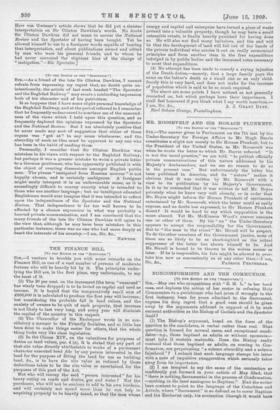THE FINANCE BILL.
pro THE EDITOR OP THE "SPECTATOR."'
venture to trouble you with some remarks on the Finance Bill, as one of a vast number of persons of moderate fortune who will be heavily hit by it. The principles under- lying the Bill are, in the first place, very unfortunate, to say the least of it.
(I) The 20 per cent, on the increment (the term "unearned" has wisely been dropped) is to be levied on capital and used as income. It is hoped that the comparatively small sum of £500,000 it is calculated to produce the first year will increase ; but considering the probable fall in land values, and the anxiety of owners to be quit of such property, at increase is not likely to last very long, and every year will diminish the capital of the country in this respect.
(2) The Chancellor of the Exchequer wrote in so con- ciliatory a manner to the Friendly Societies, and so little has been done to make things easier for others, that the whole thing looks very like claps legislation.
(3) In the Clause XIV., on the valuations for purposes of duties on land values, par. 4 (p), it ie stated that any part of that site value directly attributable to works of a permanent character executed bon& fide by any person interested in the land for the purpose of fitting the land for use as building land, &c., is to have the site value as reduced by those deductions taken to be the site value as ascertained for the purposes of this part of the Act.
But who will recoup the said "person interested " for his heavy outlay on roads and drains, gas and water ? Not the purchaser, who will not be anxious to add to his own burdens, and will certainly not spend more than he can help in acquiring property to be heavily taxed, so that the man whose
energy and capital and enterprise have turned a piece of waste ground into a valuable property, though he may have a small, ostensible rebate, is finally heavily punished for having done so. He will also not find many imitators, and the end will
• be that the development of land will fall out of the hands of the private individual who carries it out on really economical principles and form another item in the free expenditure indulged in by public bodies and the increased rates necessary to meet that expenditure.
(4) No attempt has been made to remedy a. crying injustice of the Death-duties,—namely, that a large family pays the same on the father's death as a small one or an only child. Surely this is very hard, and does not make for the increase of population which is said to be so much required.
The above are some points I have noticed as not generallY remarked on, but which perhaps have their importance. I shall feel honoured if you think what I say worth insertion.—
I am, Sir, See., A. J. GRANT DUFF% Earl Soham Grange, Framlingham.










































 Previous page
Previous page